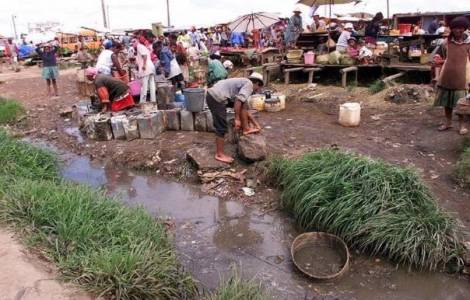
All Africa
Antananarivo (Agenzia Fides) - "In recent days there have been no reports of cases of plague in the capital. The situation has improved": says Sister Giacinta Gobetti, missionary of the minor Carmelites of charity in Antananarivo, to Agenzia Fides. After declaring the "state of emergency" by first closing schools and then banning any form of gathering in public places, the Malagasy government announced in recent days the end of the epidemic in urban areas, but the attention remains high throughout the country, which has recorded 202 deaths due to cases of plague since August, because the epidemic is seasonal and will last until April 2018.
Plague is endemic in some areas of Madagascar, but this year's epidemic has been more contagious because two-thirds of the cases were related to lung plague, which can be transmitted from human to human and can lead to death in only twenty-four hours. In addition, the spread of both lung plague and those, to a much lesser extent, bubonic plague has also affected large cities, making the epidemic more virulent in recent years. The most affected cities were the capital Antananarivo, which registered 400 cases, and those on the east coast.
"In the Casa della Carità of Antananarivo, where we host and take care of 35 people with physical or mental disabilities - explains Sister Giacinta - there have been no cases of plague and none of the people who came to be treated had symptoms. Plague spread in the cities because perhaps the pulmonary form was not recognized as infectuous compared to the bubonic plague, but there was a widespread response from the institutions: many precautions were taken - cleaning was encouraged, close attention was paid with regards to rats and garbage, while schools were temporarily closed". The Ministry of Public Health is coordinating the action to combat the epidemic with the support of the World Health Organization and the Pasteur Institute of Madagascar. Currently the situation seems under control and social life gradually resumes its normal pace.
According to the latest data collected by the government and released by WHO, from August 1 to November 27, 2017 there were a total of 2,348 confirmed, probable and suspected plague cases. All persons infected or with symptoms were guaranteed free cure and prophylaxis (WHO provided 1.2 million doses of antibiotic). The most affected region, with 68% of the cases, was that of Analamanga. No new cases of lung plague have been registered since November 14, while the last contagion of bubonic plague dates back to 8 November. Based on this information, WHO estimates that the risk of plague in Madagascar is currently moderate at a national level and low at a regional level. (ER) (Agenzia Fides, 05/12/2017)